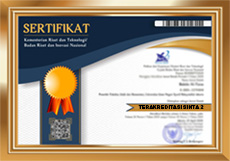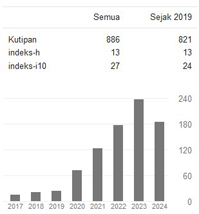POSISI PENTING ORANG DIFABEL DALAM MASYARAKAT | THE IMPORTANT PLACE OF PEOPLE WITH DISABILITIES IN SOCIETY
Abstract
Making use of the haecceitas theory of Duns Scotus, this text
critiques the statement that every person, and in fact everything
created, and especially people with disabilities, have an individual
uniqueness. This is based upon the uniqueness of the Triune God
who is relational. “Normal” people have self control, can decide
and make personal choices. They can stand on their own two
feet, and they are not dependent on others. The individuality
or personality of a disabled person is often reduced because
the disabled person is regarded as one who cannot do “normal”
activities without assistance. All living creatures are relational
beings because they have been created by and in God who is
relational. The Church witnesses, in the Athanasian Creed, to the
belief that the Triune God is Three separate Persons while being
One in Essence.
Keywords: Disability, Uniqueness, Personality, Trinity
Abstrak
Dengan menggunakan teori haecceitas dari Duns Scotus, tulisan
ini hendak mengulas kenyataan bahwa setiap manusia bahkan
setiap ciptaan, secara khusus orang dengan disabilitas, memiliki
ke-ini-an masing-masing yang bersumber dari ke-ini-an Allah
Trinitas yang relasional. Seorang manusia yang ‘normal’ adalah
orang yang menguasai diri, dapat memutuskan dan menentukan
pilihan bagi diri, mandiri, dan tidak bergantung kepada orang
lain. Individualitas ataupun kepribadian orang dengan disabilitas
sering direduksi karena orang dengan disabilitas dianggap tidak
dapat melakukan aktivitas secara ‘normal’ tanpa dibantu orang
lain. Seluruh makhluk hidup adalah makhluk yang relasional
karena diciptakan oleh dan dalam Allah yang relasional. Gereja
menyaksikan iman, melalui Pengakuan Iman Athanasius, bahwa
Allah Trinitas tidak bercampur dalam Tiga Pribadi (persona) dan
tidak terpisah dalam Esensi-Nya (substantia).
Kata kunci: Disabilitas, Ke-ini-an, Kepribadian, Komuni, Trinitas
Full Text:
PDFReferences
Basselin, Tim. “Why theology needs disability”. Theology Today. 68 (1),
-57, t.t.
Charlton, James I. ‘Nothing about Us without Us’: Disability Oppression and
Empowerment. Berkeley: University of California Press, 2000.
Creamer, Deborah Beth. Disability and Christian Theology: Embodied Limits
and Constructive Possibilities. New York: Oxford University Press,
Cross, Richard. Duns Scotus’s Theory of Cognition. New York: Oxford
University Press, 2014.
________________. “Medieval Theories of Haecceity” dalam The Stanford
encyclopedia of philosophy, disunting oleh Edward N. Zalta. https://
plato.stanford.edu/archives/sum2014/entries/medieval-haecceity
(diakses 13 Mei 2018).
Cooper, Burton. “The Disabled God”. Theology Today. 175-182, t.t.
Davis, Lennard J. Enforcing Normalcy: Disability, Deafness, and the Body.
London dan New York: Verso, 1995.
Dueck, Gil. “Reuniting Relationship and Vocation: Reflecting on the
Divine Image” dalam Direction 45/2 (2016), hlm. 149-156, 2016.
Ellington, Scott A. “‘A Relational Theology that isn’t Relational Enough’:
A Response to God and World in the Old Testament”. Journal of
Pentecostal Theology. 19 (2010), hlm. 190-197, 2010.
Haymes, Brian. “Trinity and Participation: A Brief Introduction to the
Theology of Paul S. Fiddes”. Journal of the NABPR. 7-18, t.t.
Horan, Daniel P. “Beyond Essentialism and Complementary: Toward
a Theological Anthropology Rooted in Haecceitas”. Theological
Studies 2014. 75 (1), hlm. 94-117, 2014.
Kelly, Brian. Gerald Manley Hopkins and Duns Scotus ‘Haecceitas.’ https://
www.catholicism.org/gerard-manley-hopkins-duns-scotushaecceitas.html
(diakses 13 Mei 2018).
Mikoski, Gordon S. “Better Together: New Perspectives on Human
Uniqueness”. Theology Today. 72 (2), 227-233, 2015.
Pannenberg, Wolfhart. Anthropology in Theological Perspective, diterjemahkan
oleh Matthew J. O’Connell. London dan New York: T&T Clark
International, 1985.
Patterson, Sue. “Disability and the Theology of 4-D Personhood” dalam
Theology and the Experience of Disability: Interdisciplinary Perspectives
from Voices Down Under, hlm. 9-20, disunting oleh Andrew Picard
dan Myk Habets. United Kingdom: Routledge, 2016.
Reinders, Hans S. “Being Thankful: Parenting the Mentally Disabled”
dalam The Blackwell Companion to Christian Ethics, hlm. 427-440,
disunting oleh Stanley Hauerwas. USA: Blackwell Publishing,
Siebers, Tobin. Disability Theory. USA: University of Michigan Press,
Sullivan, James. “The Athanasian Creed” dalam The Catholic Encyclopedia.
New York: Robert Appleton Company. https://www.newadvent.org/
cathen/02033b.htm (diakses 18 Mei 2018).
Vos, Antonie. The Philosophy of John Duns Scotus. Edinburgh: Edinburgh
University Press, 2006.
Ware, Kallistos. “Model for Personhood-in-Relation”. The Trinity and
an Entangled World: Relationality in Physical Science and Theology.
Disunting oleh John Polkinghorne. Michigan: Wm. B. Eerdmans,
, hlm. 107-129.
Yong, Amos. “Disability and the Gifts of the Spirit”. Journal of Pentecostal
Theology. 19 (2010), 76-93, 2010.
_____________. Theology and Down Syndrom: Reimagining Disability in Late
Modernity. Texas: Baylor University Press, 2007.
Zizioulas, John. Being as Communion: Studies in Personhood and the Church.
New York: St. Vladimir’s Seminary Press, 1985.
_________________. Communion and Otherness: Further Studies in Personhood
and the Church. New York: T&T Clark, 2006.
DOI: http://dx.doi.org/10.31385/jl.v17i2.149.159-176
Refbacks
- There are currently no refbacks.

Copyright© 2015 JURNAL LEDALERO This work is licensed under a Creative Commons Attribution-NonCommercial-ShareAlike 4.0 International License.
Institut Filsafat dan Teknologi Kreatif Ledalero Jalan Trans Maumere-Ende - Sikka - Flores - Nusa Tenggara Timur - Indonesia Telp/Fax: 0382 2426535










